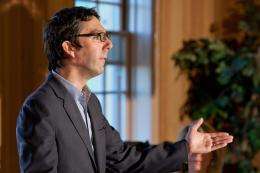When should a nation let the past be past?

South African lawyer Paul Van Zyl has helped nations all over the world overcome legacies of genocide and mass murder, in which "it's impossible to fully reveal the truth about every disappearance, every human rights violation."
Yet justice must be served. But how? And when is it time to let the past be past?
Van Zyl was the keynote speaker on a Friday afternoon panel wrestling with transitional justice, truth, reconciliation and religion. Van Zyl, former executive secretary of the South African Truth and Reconciliation Commission, was joined by Helen Stacy, a Stanford scholar in international and comparative law, and history professor James Campbell, who headed Brown University's Steering Committee on Slavery and Justice to consider black reparations.
Calls for national reconciliation can be a code word for impunity, said Van Zyl. "Generals use it when they do not want you to hold them accountable."
On the other hand, "some countries would do well to selectively forget," he said, so that they could "cohabit in the same space without killing each other."
"I agree I can't make people forgive, but it is better for them and the country if they do." Nevertheless, he said he was "deeply, deeply ambivalent about forgiveness."
"On the one hand, I have seen in many places how victims are prevailed upon to relinquish what is owed to them." These situations compound injustice and disempower victims, he said.
He recalled a nation using a system mediated by Islamic law, in which victims were paid to relinquish their right to pursue justice. "They quite literally bargained away their rights," said Van Zyl, calling this "a highjacking of faith."
"It devalued faith and corrupted the justice process."
Campbell noted "the particular way people in the West 'exoticize' people of color," assuming that their indigenous ways of conflict resolution are something that "alienated, white middle-class people don't have."
He called it a "Western vision of non-Western people living in a world without politics." However, these local forms of justice were used in Rwanda and were totally unequal to the scale of hundreds of thousands killed and imprisoned.
Beyond that, Campbell said, such romantic notions run the risk of fragmenting and compromising the "moral intuition of the 18th century" of universal human rights.
We are in the age of atrocity, he said, where violations have escalated on a previously unknown scale, noting "humanity's capacity and propensity for annihilation."
Calls for truth, justice and forgiveness can seem "like trying to hold back the tide, but few can doubt its urgency."
"Human beings are a violent species," said Campbell, noting mankind's history of genocide, slavery, ethnic cleansing, forced labor, mass rape and starvation through siege. Nevertheless, he relied on "the intuition of our shared humanity that undergirds international law."
"Great crimes inevitably leave great legacies," said Campbell. "How do societies move forward in the aftermath of great crimes?"
Stacy emphasized the impartial processes of law, equality and justice in her remarks: "I'm a secularist. I'm a deep secularist. I would rather pin my faith in process, rather than pin my faith in faith, any day of the week. And it's not because I'm a lawyer."
Stacy said she was "mindful of the ways in which great passion can divert a cool appraisal of what the situation requires." Process, she said, "is not subject to the hates and passions of faith – or even of human rights activists."
"It doesn't work all the time, but I'd rather put my faith in that."
During the question-and-answer period, one person suggested that the panel was taking religion "instrumentally" – willing to use it if it supports justice and reconciliation, and willing to jettison it and find a replacement strategy where it fails to work.
"I don't usually say this, but I am a Christian," Campbell responded, "and I find in the New Testament a profound way of thinking about the human condition, what it is to operate in a world of perplexity and pain. I'm also aware that many people are not Christian."
Some other systems "often do not revolve around forgiveness," but sometimes around notions of honor or even vengeance, he said.
While understanding the centrality of religion in the world, he was "uneasy" about the ways transitional justice "are being inflected by considerations of religions."
Van Zyl admitted he wasn't sure whether "more people have died in the name of religion than have been saved by religion." Nevertheless, he was daunted by examples of "saints who have done extraordinary, important things."
Campbell also was awed by examples of heroism, recalling the truth commission in South Africa: "I stood in amazement at Desmond Tutu, at his moral grandeur, compassion, forgiveness. I wonder if that's what we need in the field of transitional justice."
Provided by Stanford University
















